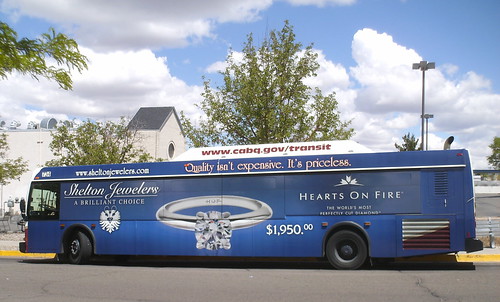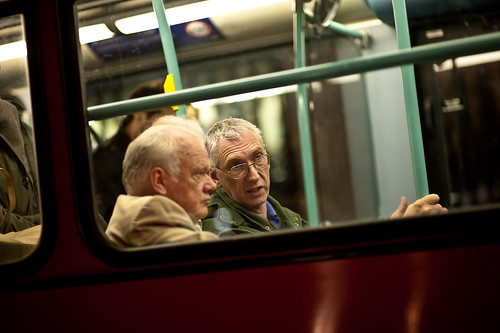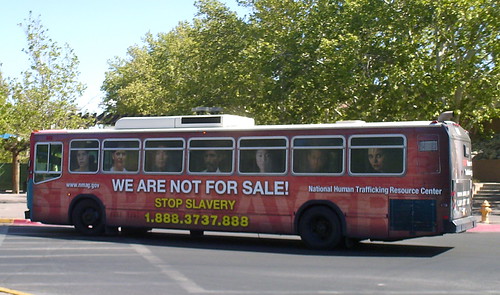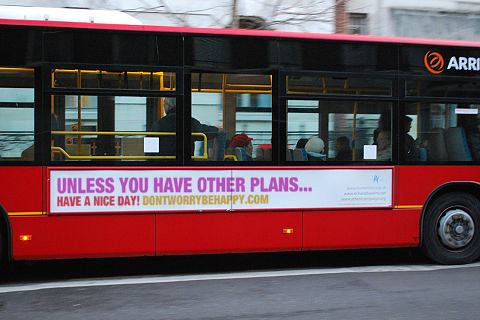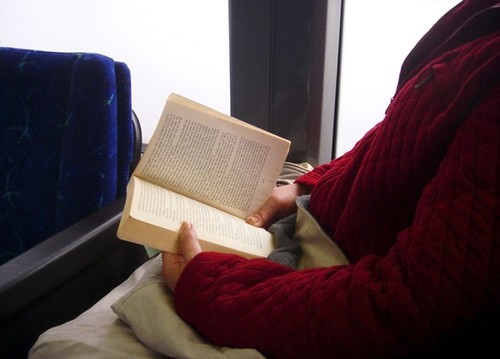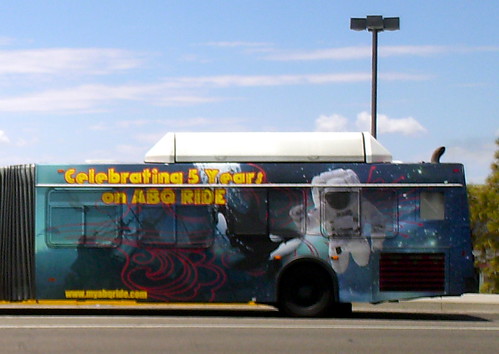Back near the end of 2007, I wrote a story about how wraps had begun changing the impact of advertising on the bus. (You can read it here.)
The reaction fell into two camps: 1) it was a tacky sell-out of a municipal service; 2) it was better than raising fares. Both camps were not necessarily mutually exclusive.
Ever since, as far as I can tell, it’s been a non-issue here in Albuquerque. The wrap ads have been dominated by casinos, attorneys, and Shelton Jewelers, while the sideboards predominately promote syndicated television series reruns and local events.
What has disappeared are the posters inside the bus. Most are now public service displays (although one of the casinos is promoting a “star search” campaign).
Probably the most provocative wrap we’ve seen is the current one highlighting a national campaign against human trafficking.
Since the overwhelming majority of us agree human trafficking is a bad thing, there’s virtually no controversy here.
However, in other communities, controversial advertising on the bus has riled some of the ridership, vexed municipal transit companies, and gotten folks involved who don’t live in the community, or even the state, where the ads have appeared.
The first such controversy I am aware of began in the fall of 2008 in London. A comedy writer and an atheist organization teamed up to respond to a series of religious advertisements they found offensive with a sideboard declaring “There’s probably no God.” (You can read the story here.)
That drew cries of protest and a counter bus advertising campaign by a Christian coalition. (I posted a story about the controversy in the spring of 2009. You can read it here.)
Following the London flap, the atheist-Christian bus ad conflict worked its way through a number of cities world wide, including here in the U.S. and in Canada. (You can read one of many, many stories here.)
Around the same time the London story broke, another, decidedly more secular, story broke in Boston about how some riders -- and drivers -- were offended by some of a series of bus ads being run by a local fresh fish purveyor. (You can read the story here.)
Tellingly, the debate came down to an interpretation of the MBTA’s “court-approved” guidelines for advertising.
A year later, in Seattle, bus advertising became more controversial and much less entertaining when King County Metro Transit accepted an ad alleging Israeli war crimes. A counter anti-Islamist ad campaign was submitted to the transit system, and the battle was on. (You can read one of the stories here.)
At the heart of the debate was whether the original ad conformed with Metro’s advertising guidelines. Big surprise: There was disagreement over whether it did or did not.
Emotions escalated on both sides, and the county sheriff was concerned: "In particular, I was concerned about innocent bus riders being converted into human billboards" on buses carrying the ads. The fear was that those buses might be targeted the way they have been in Israel -- by both sides, depending on which ad the bus was carrying.
Metro ended up electing not to run either ad and was quickly sued for violating the Constitutional right of free speech. (You can read the story here.)
The case is still not settled. However, last month, King County Metro amended its advertising policy to specifically prohibit:
• Political advertising promoting or opposing a political party; the election of any candidate or group of candidates for federal, state or local government offices; and initiatives, referendums and other ballot measures;
• Public issue advertising expressing or advocating an opinion, position or viewpoint on matters of public debate about economic, political, religious or social issues;
(You can read the story here.)
While Seattle waits for a federal court decision on the free speech issue, Trimet of Portland is adjusting to a state court decision upholding a plaintiff’s claim that refusing an ad violated plaintiff’s right to free speech. (You can read the story here.)
The free speech in question was an anti dams-on-the-Klamath-River poster.

(
You can see the website here.)
The Oregon State Court Of Appeals says Trimet violated the right to free speech when it rejected this ad based on its guidelines of accepting only commercial and public service advertising. (The challengers questioned the public service neutrality of some ads previously allowed.)
Trimet is appealing the decision to the state supreme court. But in the meantime, it finds itself pretty much in the position of having to accept any commercial or political ad submitted by anyone. They’re a little nervous about sex-related business submissions: they feel they will be compelled to accept such advertising.
Finally, if things weren’t bad enough, consider this story from the New York Times:
Here is Busboy’s take on all of this:
I’m fortunate to be living in a backwater state where a bus is still for transportation and a school bus is still for getting our kids to school. We have a tradition of live and let live, of getting along with our neighbors, of actually finding it interesting there’s a bunch of other people not just like us. And: A lot of us live together with those other people in the same neighborhoods.
I don’t know about you, but when I think of riding on a bus which carries some sort of antagonistic socio-politico-religious advertising which might make my bus some kind of target for offended parties, I’m not likely to agree that riding the bus is less hassle than driving.
Nor is such advertising the sort of conversation-starter I’m looking for with my co-riders. Most of us are just trying to get to work or get home or otherwise take care of business without the intrusion of conflict and incivility. And when we do have conversations, I’d rather hear about people’s real lives than about some advertiser’s manipulative agenda.
How many of us have ever had our positions changed by an advertisement or a bumper sticker? Conversely, how many of us have become even more intransigent in our positions after seeing an ad or bumper sticker which challenges the truth or the integrity or the wisdom of our positions? Most of these ads just add more anger and tension to our lives. Who of us needs more of this?
There is a time and place for such discussions, but public transportation isn't the place, and commuting isn't the time. When Seattle’s Metro amended its advertising policy, Metro spokeswoman Linda Thielk explained, “We’re not here to serve as a mobile debate club.” To which I respond: “Amen, brothers and sisters.”
You can take a look at ABQ RIDE’s advertising policy guidelines here. I can’t imagine how they could be any more clear, to-the-point, and all-inclusive than they are.
But I’m not a lawyer.
And I know you can’t stop progress. It’s just a matter of time before some of that American culture currently plaguing the outer 49 seeps into New Mexico and turns up at ABQ RIDE.
I’m always on the lookout for a good bus story, but it’ll be a sad day when stories about people hot and bothered and bothering each other with their political or religious or cultural persuasions become commonplace.
When the time comes, and it probably will, let’s hope the good sense in the current ABQ RIDE advertising policy guidelines is rigorously followed, then left intact by the judicial system.
